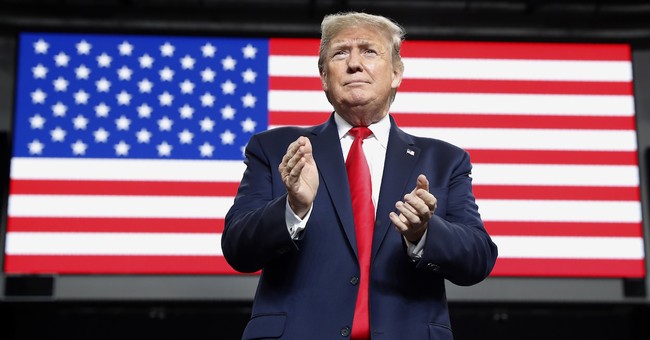Kay Coles James
Trump and the Forgotten American
The opinions expressed by columnists are their own and do not necessarily represent the views of Townhall.com.

Source: AP Photo/ Jacquelyn Martin
In his 2016 victory speech, Donald Trump talked about “the forgotten men and women of our country,” declaring that they “will be forgotten no longer.” Today, after months of impeachment proceedings, accusations of wrongdoing, and a media that has reported overwhelmingly negative stories about him for three years, his polling numbers are at their highest ever.
Why? Because the president kept his promise to remember the forgotten, and he’s continued to push ahead with policies to help them and every American.
President Trump’s “forgotten men and women” are the farmer, the factory worker, and the middle-class men and women who have been ignored or even sneered at by Washington politicians. They are the people of “flyover country” and “Middle America.” They are the people CNN host Don Lemon and his guests recently made fun of when they called Trump supporters rubes and used mock Southern accents to paint them as uneducated, illiterate, and unable to find places like Ukraine on a map.
President Trump’s “forgotten” are the average, patriotic hard-working Americans who pay taxes for government programs many of them will never use. Many are religious. Some are gun-owners. A surprising number are Democrats, independents, or political agnostics.
Indeed, black Americans are part of the forgotten, too. For decades, politicians have repeatedly promised urban communities good jobs, good schools, and safe neighborhoods. Instead, they have delivered policies that more often increased crime, degraded educational standards, and made it harder to get work. As the daughter of a former welfare recipient who spent my early years growing up in government housing, I know this more than most.
While some in the media have tried to claim that Mr. Trump’s forgotten Americans are just disaffected, angry white voters, the president has always made clear that his policies to create jobs, lower taxes, and open up opportunities would help everyone, including blacks and other minorities.
In fact, the Trump tax cuts and the repeal of piles of job-killing regulations have grown the economy and reduced unemployment to levels not seen in nearly 50 years. Moreover, minorities and women are seeing some of the greatest benefit, experiencing some of their lowest unemployment rates ever. On top of all that, America’s lowest income earners have seen their wages grow faster (in percentage terms) than any other income group.
The latest jobs report released last week confirms that since President Trump was elected, employment gains have been positive for a record-setting 112 months. Wages and salaries have grown an average of 3.1 percent over the past 12 months, with wages for production and nonsupervisory workers growing even faster at 3.3 percent.
It’s not just the increases in jobs and incomes that are having an impact. America’s increased energy production has lowered energy prices and the costs to heat our homes and drive our cars, and these savings are being felt the most by those with the least disposable incomes.
We know that these successes are resonating with the forgotten. According to a new Gallup survey, Americans' views of their personal financial situation have been climbing since 2018 and are now at record highs. Nearly six in 10 Americans now say they are better off financially than they were a year ago.
More proof that those once forgotten are seeing positive changes came last week from former Obama advisor and CNN commentator Van Jones following the State of the Union address. Mr. Jones told Democrats that African-Americans were starting to gravitate to the president because he had delivered real results for them. “Warning to Democrats,” he said. “What [President Trump] was saying to African-Americans can be effective… We’ve got to wake up, folks.”
The forgotten – black, white, Hispanic, whatever-Americans – are seeing unprecedented successes under a president who said he wouldn’t forget them. Imagine the possibilities if those in Washington opposed to the president put aside their personal animus, ceased looking for ways to stop him, and realized that the successes he is achieving are successes for the American people.
Imagine what could be accomplished if Congress and the president started working together. Those once forgotten could flourish even more.
